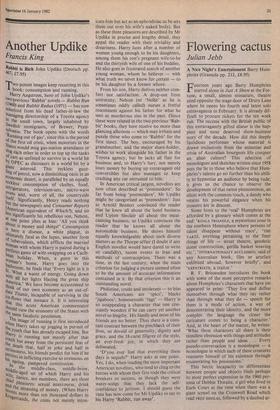Another Updike
Francis King
Two potent images keep recurring in this book: consumption and running. Harry Angstrom, hero of John Updike's two previous 'Rabbit' novels — Rabbit Run (1960) and Rabbit Redux (1971) — has now Inherited from his dead father-in-law the managing directorship of a Toyota agency the small town, largely inhabited by Swedish immigrants, of Brewer, Penn- sylvania. The book opens with the words Running out of gas', since this is the period of the first oil crisis, when motorists in the States would mug gas-station attendants or slug each other in order to top up the tanks of cars as unfitted to survive in a world hit by OPEC as dinosaurs in a world hit by a giant asteroid. This reckless guzz- ling of petrol, now a diminishing oasis in an economic desert, is paralleled by an equally reckless consumption of clothes, food, refrigerators, television-sets, micro-wave ?yens and, worst of all, the countryside Itself. Significantly, Henry reads nothing but the newspapers and Consumer Reports (American equivalent of Which7); and no less significantly his rebellious son, Nelson, at One point jibes at him: 'All you think a °out is money and things!' Consumption Is here a disease, a white plague, as ultimately fatal as the lupus, another form of tuberculosis, which afflicts the married woman with whom Harry is paired during a perilous game of wife-swapping on a Carib- bean holiday. When, a guest in this bathroom, home, Harry goes into the roathroom, he finds that `Every light in it is What a waste of energy. Going down with all her lights blazing the great ship America.' We have become accustomed to think of our own economy as an out-of- date Titanic, incapable of surviving in the eke-flows that menace it. It is interesting that this acute American commentator should view the economy of the States with the same fatalistic pessimism. miThe image of running is first introduced th'en Harry takes up jogging in pursuit of e You that has already escaped him. But Harry is running not merely after that ,Y,°11th but away from the persistent fear of death that, half in joke and half in seriousness, his friends predict for him if he persists in inflicting exercise so strenuous on st ageing, pampered constitution. 41.41 the middle-class, middle-brow, w!ddle-aged set of which Harry and his chl.fe Janice, are members, there are three chief Pleasures: sexual intercourse, drink and the amassing of money. (When Harry L. vests more than ten thousand dollars in "Algerrands, the coins not merely intox-
icate him but act as an aphrodisiac as he sets them out over his wife's naked body). But as these three pleasures are described by Mr Updike in precise and lengthy detail, they appal the reader with their triviality and dreariness. Harry lusts after a number of women young enough to be his daughters, among them his son's pregnant wife-to-be and the thirtyish wife of one of his buddies. He also goes in frustrated search of another young woman, whom he believes — with what truth we never know for certain — to be his daughter by a former whore.
From his son, Harry derives neither com- fort nor satisfaction. A drop-out from university, Nelson (or 'Nellie' as he is sometimes oddly called) nurses a fretful resentment against his father for what he sees as murderous sins in the past. (Since these were related in the two previous 'Rab- bit' books, they here receive no more than glancing allusions — which may irritate and puzzle those who come to 'Rabbit' for the first time). The boy, encouraged by his grandmother, and the major share-holder, wishes to work alongside his father in the Toyota agency, but he lacks all flair for business and, to Harry's fury, not merely loses money by buying up extravagant old convertibles but also manages to keep crashing any car entrusted to him.
In American critical jargon, novelists are now often described as 'postmodern'. So far from being 'postmodern', Mr Updike might be categorised as 'premodern'. Just as Arnold Bennett convinced the reader that he knew all about the hotel business and Upton Sinclair all about the meat- canning business, so Updike convinces the reader that he knows all about the automobile business. He shows himself equally knowledgeable about such diverse matters as the Thorpe affair (I doubt if any English novelist would have dared to write so candidly), recent events in Iran and methods of contraception. There was a time, in the last century, when the main criterion for judging a picture seemed often to be the amount of accurate information contained in it. By that criterion this is an outstanding novel.
Philistine, crude and intolerant — to him South Americans are 'spics', blacks jigaboos', homosexuals 'fags' — Harry is so unappealing a character that one con- stantly wonders if he can carry yet another novel so lengthy. His family and most of his friends are no better. Thus there is a cons- tant contrast between the pinchbeck of their lives, so devoid of generosity, dignity and grace, and the 18-carat filigree of the style, an ever-fresh joy, in which they are delineated.
`D'you ever feel that everything these days is sequels?' Harry asks at one point. Yes, I do, when reading the most important American novelists, who tend to cling to the heroes with whom they first rode the critical breakers to success, as though they were water-wings that they lack the self- confidence to jettison. I should guess the time has now come for Mr Updike to say to his Harry 'Rabbit, run away'.


































 Previous page
Previous page